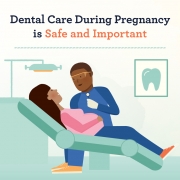Supporting Children’s Oral Health Should Start Before Birth

February is National Children’s Dental Health Month — a great opportunity to spotlight the importance of oral health to children’s overall health and well-being. Dental caries, the disease that causes tooth decay, remains the most common health condition of childhood, ahead of asthma and obesity. The impact of dental caries goes far beyond a cavity. For young children, for example, tooth decay can harm their ability to succeed in school, leading to increased absences and lower grade-point averages. Fortunately, not unlike many chronic conditions, we know that early prevention can pay crucial dividends.
So let’s focus our efforts on giving children a healthy start through interventions that begin as early as possible — during pregnancy. Yes, even before a child is born, we can take steps to support their oral health. Dental care is often an overlooked aspect of prenatal care. Research shows that a mother’s oral health is a good predictor of her child’s oral health. Children are three times more likely to experience cavities if their mothers have high levels of untreated tooth decay.
These research findings shed light on opportunities for intergenerational care, an area of focus for PolicyLab, to improve children’s health by improving their caregivers’ dental health. Our organization, the Children’s Dental Health Project (CDHP), is launching a project soon to examine the links between parents’ and children’s oral health status and coverage — and the associated policy implications.
Barriers to Pregnant Women Receiving Appropriate Oral Health Care
The American College of Obstetricians and Gynecologists has affirmed “the safety and importance of oral health care during pregnancy.” Yet many pregnant women aren’t getting the services they need. Four in 10 pregnant women have tooth decay or gum disease. A recent survey revealed that not even half of all women (only 42 percent) know it is safe to receive routine dental care during pregnancy. In Pennsylvania, the most recent data shows that only about half of all pregnant women were counseled by dental professionals about their oral health.
In addition to attitudinal barriers, cost and lack of dental coverage pose significant hurdles. Today, one in three adults lacks dental benefits. In the private market, dental and medical plans are often sold separately, creating an obstacle to oral health coverage for many. The status of dental benefits within the health care safety net is also inadequate. At the federal level, Medicaid does not guarantee dental benefits for adults, including pregnant women. This gap has unique implications for care during pregnancy as women, particularly for women of color who are disproportionately enrolled in Medicaid nationwide.
Thankfully, some states do offer oral health coverage, at varying levels, for adults and/or pregnant women in their Medicaid programs. Pennsylvania’s Medical Assistance (Medicaid) program offers pregnant women a range of basic dental benefits; almost 660,000 nonelderly women were dentally insured through the program in 2013. (State data don’t specify how many of these women were pregnant, which is a challenge we elaborate on below.)
Recommendations to Improve Oral Health Care for Pregnant Women
Medical and dental health providers and their community partners are uniquely positioned to set children on a healthy path by improving the oral health of pregnant women and their newborns:
- Health providers across departments can open a conversation about oral health including healthy hygiene and nutritional habits for moms and children. In addition to asking about their mouth, teeth, and gums, clinicians can reassure women that receiving dental care throughout pregnancy is both safe and important — and refer them to dental providers, as needed.
-
 This infographic can help. Both English and Spanish versions highlight key information pregnant women should know about maintaining and improving their oral health (and that of their newborns). For example, women might not realize that gum disease may be linked to adverse birth outcomes or that there are simple steps they can take to protect their babies’ primary teeth from decay. CDHP and the American Academy of Pediatrics created this infographic.
This infographic can help. Both English and Spanish versions highlight key information pregnant women should know about maintaining and improving their oral health (and that of their newborns). For example, women might not realize that gum disease may be linked to adverse birth outcomes or that there are simple steps they can take to protect their babies’ primary teeth from decay. CDHP and the American Academy of Pediatrics created this infographic. - Health providers, hospital administrators and others can learn more by reviewing the National Maternal and Child Oral Health Resource Center’s Oral Health Care During Pregnancy: A National Consensus Statement. It contains guidance to integrate oral health care and education into the health care system. Ideas include enhancing patient intake forms; strengthening medical-dental provider relationships; and better coordinating with community-based programs that serve low-wage women and families.
- It’s important for health professionals and advocates to talk with Pennsylvania’s policymakers about the importance of dental coverage — for children and adults. During tough budgetary times, adult dental benefits are often a leading target for cuts. In addition, key stakeholders can invest more in outreach to Medicaid-eligible pregnant women. Women who are pregnant need to know about the dental coverage available to them, how to enroll, and how to use those benefits. Enrollment outreach and support may go a long way toward helping low-income pregnant women get the oral health care they need.
- Finally, making progress requires having better and more actionable data. Oral health experts have pointed to “a lack of timely, consistent, and readily-available data to adequately describe the state of oral health across populations.” This is especially true for pregnant women. Health stakeholders could encourage Pennsylvania to be an exemplar state by instituting oral health metrics and more rigorous reporting requirements into its Medicaid program. In addition, the state could actively participate in public health surveillance efforts aimed at better understanding the oral health of pregnant women.
There are many tools to support women’s dental health needs during pregnancy within and beyond the hospital setting. During Children’s Dental Health Month and throughout the year, educating pregnant women about the importance of oral health is a crucial first step. By improving pregnant women’s oral health, we can help place our children on a path toward achieving their full potential.
Meg Booth, MPH, is executive director of the Children’s Dental Health Project, a policy institute in Washington, DC. Learn more at www.cdhp.org.
